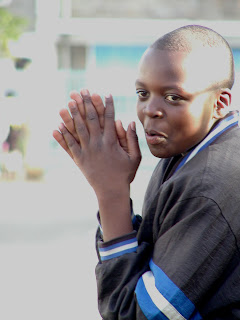When I have been in Kisii, fruit and vegetables were always in abundance, for sale in small stalls or stacked on blankets all along the Rongo-Kisii road, in the open market, in fact anywhere someone could set up a stall.
However, having been indoctrinated in the buy-everything-in-one-shop mentality of most Brits, if I was in the local supermarket, I would go through the fresh food department, only to find two or three shriveled carrots, a moldy mango, no sukuma, and little else.
It soon struck me that if I wanted fresh fruit and veg, I had to get it outside. But, buying from these stalls along the side of the road, so close to the road, where overloaded lorries laboured up the hill, belching out black, choking diesel fumes all over the wares, was very off-putting.
Venturing into the open market by myself was also a little daunting.
Don't get me wrong. I don't feel threatened in Kisii, or anywhere else in Kenya, but I am aware of pick-pockets, and I have been accosted more than once by people asking for handouts, sometimes quite forcefully. So I only venture into the market when accompanied by a friend (or two!)
So why do the supermarkets have such a poor selection and quality of vegetables and fruit? It's not rocket science. I guess they can't compete with the stall-holders. It is just not worth their while to stock quantities of the stuff. After all, right outside, there is a stall selling mangoes, pineapples, apples, bananas, as well as various fresh herbs and spices - no contest.
Thinking about it, most fruit comes well wrapped in its own skin. Once peeled, with a bit of luck, they are just as wholesome as the sterilised, force-ripened, over-priced junk we buy from our supermarkets in the UK.
And we have fruit on our plot. This is well away from the main road. The soil around Kisii is very fertile and of course, it rains all year round, so growing two or even three crops a year should not be impossible.
There is nothing better than fruit ripened on the tree. I am always disappointed when I get back home and tuck into a regulation straight banana that was cropped green and ripened on its way to the UK. They are tasteless.
We have avocados growing on the plot as well. The problem is that I have yet to meet anyone in Kisii that knows what to do with them! Maybe I should ship Jamie Oliver, HFW or AWT over there - or how about Steve and Dave, the Hairy Bikers? They would know what to do with a tree-full of avocados- and enjoy the ride as well.
Food - for thought












































